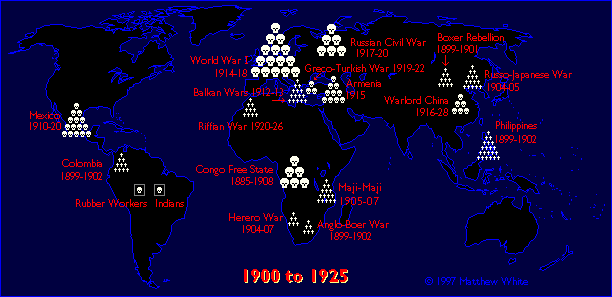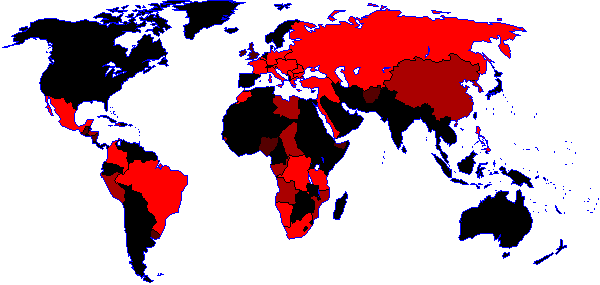
Wars and Atrocities in the First Quarter of the Twentieth Century
Magnitude:


Intensity:

![]()
Contemporary Context:

When beginning a discussion of war in the Twentieth Century, it's customary to emphasize how peaceful the world had been for the past hundred years. Not since the fall of Napoleon had the Great Powers rampaged across Europe as they had been doing since time immemorial. The few Great Power wars that had broken out in the interim had been distant, short and simple. Civilans were not military targets. Worldwide empires had been scooped up in the 19th Century by trivial deployments of modern troops swatting down primitive tribesmen. When the First World War erupted in 1914, no one knew what was in store for them.
Of course, the only part of this summary that's indisputedly true is that several decades had passed since two European powers had gone to war with one another -- France and Germany in 1871. As for the rest, well, history is never that simple.
The first decade of the Twentieth Century had already seen massive genocides in German and Belgian Africa. Mexico was about to launch into a homicidal uprising in which factions massacred one another without mercy. In the Far East, the emergent Great Powers of Japan and Russia battled for dominance, while the peace treaty was mediated by a third emerging power, the United States.
But it's true that the heartland of European civilization had seen an unprecedented generation of peace. The only blight on the continent was in the south east corner where the decline of the Ottoman Empire was creating a power vacuum that tempted hungry neighbors and oppressed minorities into squabbling over the carcass. In 1914, one such squabble ignited a war so devastating and unpresedented that the only appropriate name for it was World War. And it was only the first.
Average: During this period throughout the world, wars, genocide and oppression killed approximately 23,000 out of every 1,000,000 people (2.3% of the world).
![]()
Last updated November 1999.
Copyright © 1999-2000 Matthew White